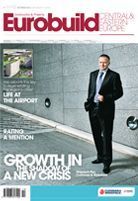The first thing that strikes you when you look at the list of categories for the Eurobuild Awards 2011 is that there are a lot of them - 30 in total. The reason why there are so many is that we want to cover every major type of profession in the property market
At last year's gala, our main concern was that the awards presentation part of the ceremony would last too long, with 21 categories. This worry proved to be unfounded. The first winner to be presented with an award, Brian O'Brien of PwC, was very quick and to the point with his thanks and acknowledgements and this set the tone for the other winners. We completed the prize-giving in good time.However, after last year's gala we were approached by architects, construction firms, property management companies, facility management companies and engineering consultancies, all asking why there hadn't been a category for them. Ok, our offices weren't besieged and our phone lines didn't collapse under the weight of angry callers, but at




























































